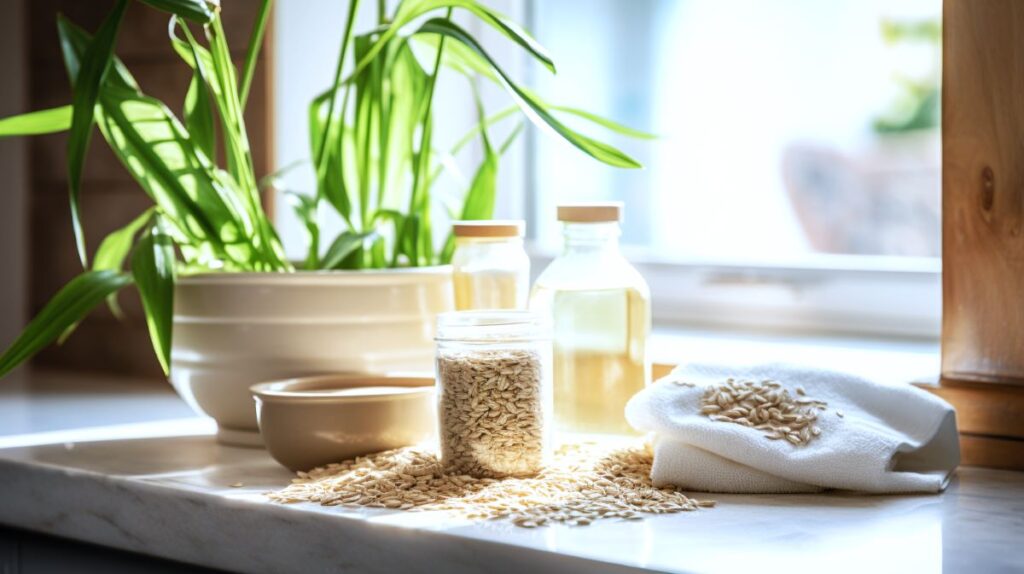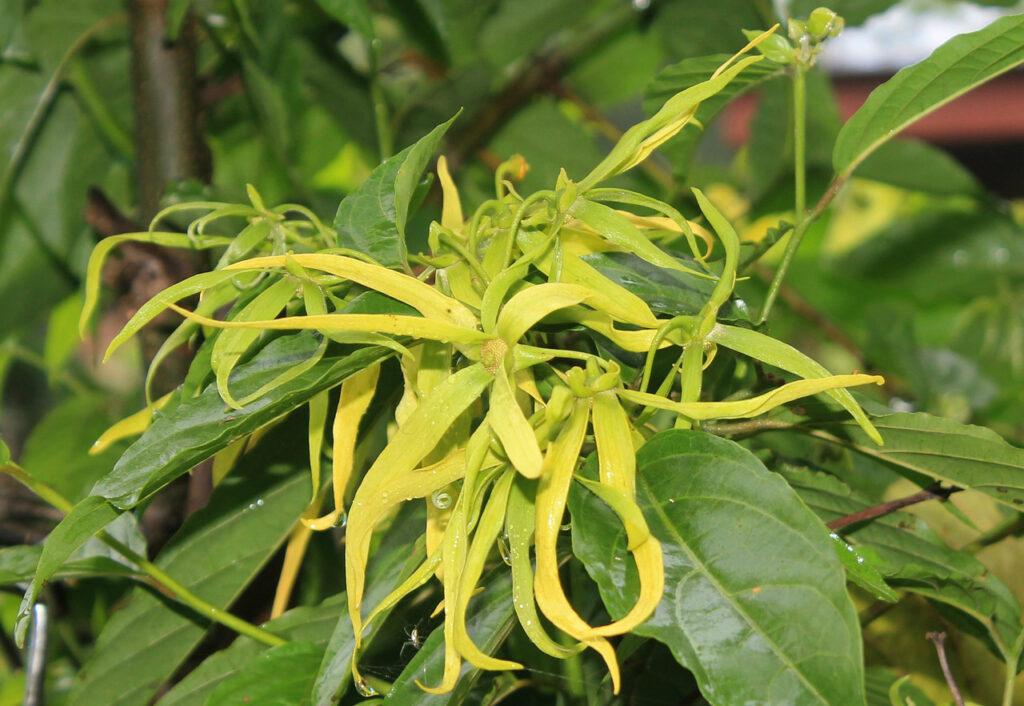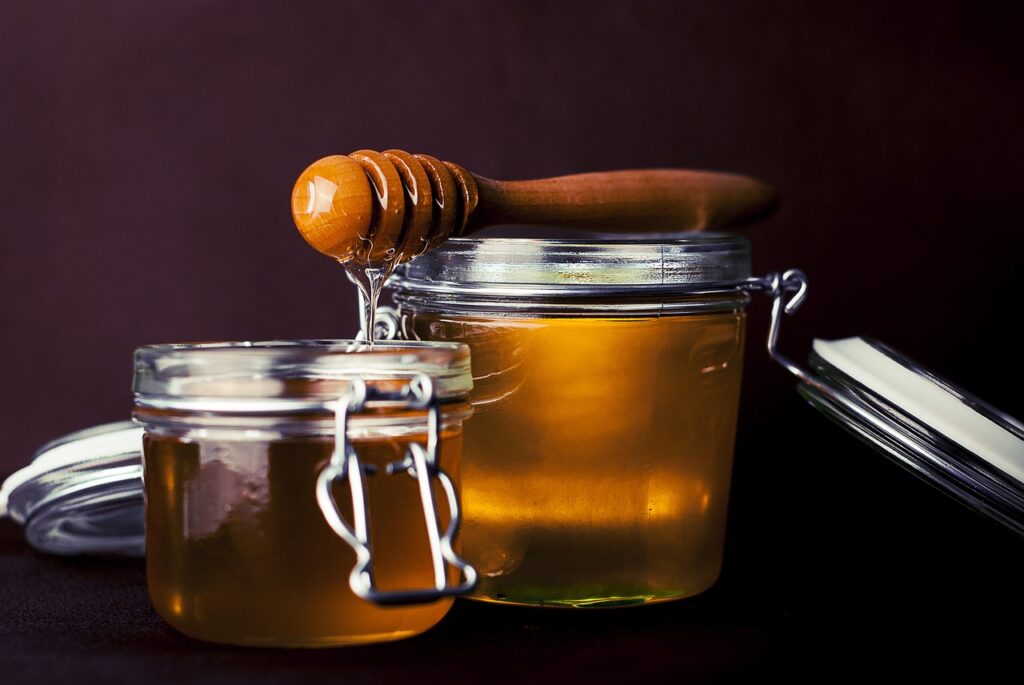DIY Oatmeal Face Mask: Easy Recipe and 17 Common Ingredients
Oatmeal is not just a healthy breakfast option but has numerous benefits for the skin. It’s also known to soothe irritated skin, reduce inflammation, and moisturize dry skin. It is no wonder that oatmeal is a popular ingredient in many skincare products, including face masks.
However, store-bought face masks can be expensive, and the ingredients list can be long and confusing.
That’s where DIY oatmeal face masks come in.
Making a DIY oatmeal face mask is easy and affordable. All you need is some oatmeal and a few other ingredients that you probably already have in your kitchen. They can be customized to suit different skin types and concerns. Whether you have dry, oily, or sensitive skin, any DIY oatmeal mask recipe can easily be tailored to your skin type.
In this article, we will explore the benefits of oatmeal for the skin and provide some easy DIY oatmeal face mask recipes that you can try at home. With these recipes, you can give your skin the TLC it deserves without breaking the bank or exposing it to harsh chemicals.
Understanding the Benefits of Oatmeal
Oatmeal’s an amazing breakfast treat when cooked right, but it’s an incredible skincare ingredient, too. It’s been used for decades for eczema sufferers for the reasons mentioned a bit ago. There are also several soaps, including DIY soaps, that contain colloidal oatmeal as a key ingredient for that reason.
- Colloidal oatmeal, a finely ground version of oatmeal, is particularly effective in skincare products due to its ability to form a protective barrier on the skin. This barrier helps to lock in moisture and prevent irritation and inflammation.
- It’s rich in minerals such as magnesium, potassium, and phosphorus. These minerals help to nourish the skin and promote a healthy, glowing complexion.
- Oatmeal contains avenanthramides, which are unique antioxidants that have been shown to soothe and calm irritated skin.
- Avena sativa, the scientific name for oats, is also a natural source of saponins, gentle cleansing agents that help remove dirt and impurities from the skin.
Clearly, oatmeal is a versatile and effective ingredient in skincare, making it a fantastic option for DIY face masks. Its anti-inflammatory, antioxidant, and nourishing properties make it an excellent choice for all skin types, particularly those with sensitive or irritated skin.
Why DIY Face Masks
DIY face masks have become increasingly popular in recent years, and for good reason. Not only are they cost-effective, but they also offer a range of benefits that store-bought masks may not provide. Here are a few reasons why you should consider making your own face mask, specifically an oatmeal face mask.
Cost-Effective
DIY face masks are a great way to save money, as they typically require only a few ingredients that you may already have in your pantry. Oatmeal, for example, is a common household item that can be used as a base for a face mask, making it an affordable option.
Customizable
As mentioned earlier, one of the biggest advantages of making your own face mask is that you can customize it to suit your specific skin type. Oatmeal, for instance, is great for those with sensitive skin, as it can help soothe irritation and reduce inflammation. You can create a face mask that targets your unique skin concerns by experimenting with different ingredients.
Natural Ingredients
Many store-bought face masks contain harsh chemicals that can irritate the skin. DIY face masks, on the other hand, often use natural ingredients that are gentle and nourishing. Oatmeal, for example, is a natural exfoliant that can help remove dead skin cells and reveal a brighter complexion.
As discussed elsewhere, one goal at Enticingly Simple is to equip readers with the ability to reduce their regular exposure to synthetic chemicals. That includes transitioning to natural solutions, from the toothpaste you brush with daily to the cleaners you expose yourself to; natural solutions are effective in their own right.
Easy to Make
Making your own face mask is easier than you may think. With just a few simple ingredients and a little time, you can create a mask tailored to your skin’s needs. Plus, you can make a larger batch and store it for future use.
DIY oatmeal face masks are a cost-effective, customizable, and natural alternative to store-bought masks. By making your own mask, you can take control of your skincare routine and achieve healthy, glowing skin.
17 Amazing Ingredients for DIY Oatmeal Face Mask Recipes
Making a DIY oatmeal face mask is a simple and cost-effective way to improve your skin’s health. The ingredients for this mask are easily available and can be found in most kitchens. Here are some of the ingredients you can use to make a DIY oatmeal face mask:
- Oatmeal: Oatmeal is the main ingredient in this face mask. It is rich in antioxidants and has anti-inflammatory properties that can help soothe irritated skin. Oatmeal can also absorb excess oil and moisture from the skin, making it an excellent ingredient for people with oily skin. Grinding oatmeal into a fine powder to make colloidal oatmeal is recommended.
- Honey: Honey is a natural humectant that can help moisturize the skin. It also has antibacterial properties that can help prevent acne and other skin infections. When it comes to skincare, any honey will do, but manuka honey is best.
- Milk: Milk is rich in lactic acid, which can help exfoliate the skin and remove dead skin cells. It also contains vitamins and minerals that can nourish the skin.
- Coconut oil: Coconut oil is a natural moisturizer that can help hydrate the skin and also has antimicrobial properties that can help with acne and similar skin issues.
- Apple: Apples contain alpha-hydroxy acids (AHAs) that can help exfoliate the skin and improve its texture. They also contain vitamins and minerals that can nourish the skin.
- Yogurt: Yogurt is rich in lactic acid, which can help exfoliate the skin and remove dead skin cells. It also contains probiotics that can help balance the skin’s microbiome.
- Apple cider vinegar: Apple cider vinegar has astringent properties that can help tighten the skin and reduce the appearance of pores. It also has antibacterial properties that can help prevent acne and other skin infections.
- Lemon: Lemon contains citric acid, which can help exfoliate the skin and improve its texture. It also has antibacterial properties that can help prevent acne and other skin infections.
- Almond oil: Almond oil is a natural moisturizer that can help hydrate the skin. It also contains vitamins and minerals that can nourish the skin.
- Banana: Bananas contain vitamins and minerals that can nourish the skin. They also contain antioxidants that can help protect the skin from damage.
- Sage: Sage has anti-inflammatory properties that can help soothe skin, plus antimicrobial properties that can help prevent acne and other skin infections.
- Rose water: Rose water has astringent properties that can help tighten the skin and reduce the appearance of pores. It also has anti-inflammatory properties and helps to soothe the skin, including irritated skin.
- Cinnamon: Cinnamon has antimicrobial properties that can help prevent acne and other skin infections. It also has anti-inflammatory properties that can help soothe skin.
- Aloe: Aloe has anti-inflammatory properties that can help soothe the skin. It also has moisturizing properties that can help hydrate the skin.
- Green tea: Green tea contains antioxidants that can help protect the skin from damage. It also has anti-inflammatory properties that can help soothe irritated skin.
- Cucumber: Cucumber has astringent properties that can help tighten the skin and reduce the appearance of pores. It also has anti-inflammatory properties and can reduce inflammation.
- Jojoba oil: Jojoba oil is a natural moisturizer that can help hydrate the skin. It also has anti-inflammatory properties that can help soothe irritated skin.
Recipes could include a combination of any of the above ingredients to make a DIY oatmeal face mask, even egg whites, which we didn’t include above. Each ingredient has its own unique benefits for the skin. When making a DIY face mask, it’s important to choose ingredients that are suitable for your skin type and avoid any ingredients that may cause irritation or allergic reactions.
Lastly, essential oils can be combined with a basic face mask recipe to glean from their many skincare benefits. That opens up endless options for tailoring your face mask recipe to your skin type, as well as the overall skincare benefit profile you’d like to achieve.
Preparation and Application
Preparing and applying an oatmeal face mask is a simple process that can be done at home with just a few ingredients.
To make the mask, one can use a food processor or blender to grind rolled oats into a fine powder. Alternatively, one can use pre-ground oat flour. A recipe for a basic oatmeal face mask is as follows:
- 1/2 cup of rolled oats or oat flour
- 1/4 cup of warm water
- 1 tablespoon of honey
- Essential oils (optional, according to preference)
To prepare the mask, mix the oats and warm water in a bowl until it forms a paste. Then, add the honey and mix well.
Before applying the mask, it is important to have a clean face. One can cleanse their face with a gentle cleanser and warm water or use a facial steamer to open up pores.
It is also recommended to do a patch test on a small area of skin before applying the mask to the entire face. This can help ensure the mask does not cause any adverse reactions or irritation.
Once the mask is prepared and the face is clean, apply the mask in a thin, even layer to the face. Avoid the eye area and any open wounds or cuts. Leave the mask on for 10-15 minutes or until it has completely dried.
To remove the mask, gently rinse the face with warm water and pat dry with a towel. Follow up with a moisturizer to hydrate the skin.
Preparing and applying an oatmeal face mask is an easy and affordable way to relax comfortably at home with a spa-like treatment. Turn on a diffuser and some relaxing music, close your eyes, and pamper yourself.
Specific Skin Conditions and Oatmeal Masks
Oatmeal masks are a popular choice for those looking for a DIY face mask option that can help with specific skin conditions. Here are some common skin issues and how oatmeal masks can help:
Dry Skin
Oatmeal is a natural humectant, which means it can help to lock in moisture and keep skin hydrated. Oatmeal masks can be especially beneficial for those with dry skin, as they can help to soothe and moisturize the skin.
Sensitive Skin
Oatmeal is also known for its soothing properties, which can make it a great option for those with sensitive skin. Oatmeal masks can help to calm and soothe irritated skin, reducing redness and inflammation.
Acne-Prone Skin
Oatmeal masks can be a great option for those with acne-prone skin, as they can help to exfoliate and remove dead skin cells. This can help to unclog pores and reduce the occurrence of breakouts. Additionally, oatmeal contains anti-inflammatory properties, which can help to reduce inflammation associated with acne.
After you apply the mask, wash with a natural and gentle cleanser, then apply a light moisturizer that’s suitable for acne.
Aging Skin
Oatmeal contains antioxidants, which can help to protect the skin from damage caused by free radicals. This can help reduce fine lines and wrinkles, making oatmeal masks a great option for those with mature skin.
Eczema and Psoriasis
Oatmeal has been shown to have anti-inflammatory properties, which can make it a great option for those with eczema or psoriasis. Oatmeal masks can help to soothe inflamed skin, reducing itching and irritation.
Oatmeal masks can be a great option for those looking for a natural, DIY face mask that can help with various skin issues. For those with sensitive skin especially, it’s not always easy to find something that’s gentle enough.
Oatmeal is about as gentle as it gets! Of course, it’s never a bad idea to patch-test first.
7 Additional Skincare Reminders for Healthy Skin
In addition to using an oatmeal face mask, there are other skincare tips that can help improve the appearance and health of your skin.
1.) Hydrate: Drinking plenty of water is essential for maintaining hydrated, healthy skin. Aim for at least eight glasses of water per day.
2.) Cleanse: Use a gentle cleanser to remove dirt, oil, and makeup from your skin. Avoid harsh, abrasive cleansers that can strip your skin of its natural oils.
3.) Moisturize: After cleansing, apply a moisturizer to your face to keep your skin hydrated and soft. Look for moisturizers that contain ingredients like lactic acid, niacin, and zinc, which can help improve the texture and appearance of your skin.
4.) Protect from UV radiation: Protect your skin from the harmful effects of UV radiation by wearing a sunscreen SPF rating suitable for your sun exposure on any given day. You can also wear a hat or seek shade during peak sun hours, which is what we typically do to avoid exposure to the chemicals in traditional sunscreens.
5.) Use skin care products with essential oils: Essential oils like patchouli and palmarosa can help nourish and moisturize the skin. Look for skincare products that contain essential oils and other natural ingredients to help keep your skin healthy and radiant.
6.) Use an astringent: An astringent can help remove excess oil from your skin and tighten your pores. Many natural ingredients have astringent properties, like tea tree essential oil.
7.) Incorporate vitamin E: Vitamin E is a powerful antioxidant that can help protect your skin from damage caused by free radicals. Look for skincare products that contain vitamin E to help keep your skin looking young and healthy.
Following these additional skincare tips can help keep your skin looking its best. And, perhaps most importantly, you’ll take yet another step to reduce your regular exposure to chemicals from traditional skincare products.
Homemade Oatmeal Face Mask DIYs
What are the benefits of using an oatmeal face mask?
Oatmeal face masks are known for their ability to soothe and hydrate the skin. They can also help to reduce inflammation and redness, making them a great choice for people with sensitive skin. Oatmeal contains saponins, which are natural cleansers that can help to remove dirt and impurities from the skin.
How do you make an oatmeal face mask for eczema?
Mix 1/2 cup of ground oats with 1/4 cup of warm water to make an oatmeal face mask for eczema. Let the mixture sit for a few minutes until the oatmeal has absorbed the water and become soft. Add 1 tablespoon of honey and 1 tablespoon of coconut oil to the mixture and stir well. Apply the mask to your face and leave it on for 15-20 minutes before rinsing off with warm water.
Can an oatmeal face mask help with rosacea?
Oatmeal face masks can be helpful for people with rosacea because they can help reduce inflammation and redness. To make an oatmeal face mask for rosacea, mix 1/2 cup of oatmeal with 1/4 cup of plain yogurt and 1 tablespoon of honey. Apply the mixture to your face and leave it on for 15-20 minutes before rinsing off with warm water.
What are the benefits of using milk and oatmeal in a face mask?
Milk and oatmeal are both great ingredients for hydrating and soothing the skin. Milk contains lactic acid, which can help to exfoliate and brighten the skin. To make a milk and oatmeal face mask, mix 1/2 cup of oatmeal with 1/4 cup of milk and 1 tablespoon of honey. Apply the mixture to your face and leave it on for 15-20 minutes before rinsing off with warm water.
Keep in mind that if you have allergies to dairy, you should avoid using milk on your skin. Instead, you could just use water for your mask.
Is an oatmeal face mask suitable for dry skin?
Yes, oatmeal face masks are great for people with dry skin because they can help to hydrate and soothe the skin. To make an oatmeal face mask for dry skin, mix 1/2 cup of oatmeal with 1/4 cup of warm water and 1 tablespoon of honey. Apply the mixture to your face and leave it on for 15-20 minutes before rinsing off with warm water.
Can an oatmeal face mask help with blackheads?
Oatmeal face masks can help remove dead skin cells and unclog pores, which can help reduce the appearance of blackheads. Mix 1/2 cup of ground or colloidal oatmeal with 1/4 cup of warm water and 3-5 drops of tea tree, lavender, or myrtle essential oil to make an oatmeal face mask for blackheads. Apply the mixture to your face and leave it on for 15-20 minutes before rinsing off with warm water.


